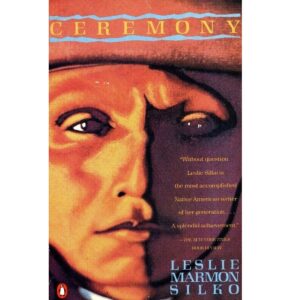 Ceremony (Penguin Classics, 2006, anniversary edition) by Leslie Marmon Silko
Ceremony (Penguin Classics, 2006, anniversary edition) by Leslie Marmon Silko
Angst, alienation, despair, feeling like a stranger in a strange land, the search for independence, the desire for acceptance — these are the staples of YA literature. Add to those themes the hardships of young men returning home from a foreign war and their struggles to rediscover their place in a changed home front, and you have Ceremony by Leslie Marmon Silko. Published in 1977, it’s believed to be the first novel published by a Native American woman. Silko, a poet as well as a novelist, was born in Albuquerque and raised on Laguna Pueblo. Infused with poetry as well as the power of story- telling in the Pueblo oral tradition, the non-linear format of the novel mimics the cyclic nature of the Native worldview. Tayo and other young veterans of World War II return to the Pueblo, and as they struggle against the despair of their war experiences they must deal with violence, alcoholism and death. As Tayo remembers and re-enacts the old stories, they help him to connect with his family and community through his own personal ceremony. At the end of the novel, the character “old Grandma” acknowledges the continuous and fluid circle of life, death and interconnected change on the Pueblo — “It seems like I already heard these stories before—only thing is, the names sound different.”
Young adult readers might like similar books still in print—the Pulitzer prize winning novel House Made of Dawn by N. Scott Momaday (Harper Perennial Modern Classics, 2010), which also recounts the struggles of a returning Native American World War II veteran, and Edward Abbey’s The Brave Cowboy (Harper Perennial, 1992). Abbey’s novel tells the story of a transient cowboy in the post-World War II era who fights against modern rules and technology, and is pursued by federal agents for refusing to register for the armed services draft. All of these timeless novels will resonate with both young adults and older readers, since the human spirit’s search for the meaning of life, the desire to release feelings of despair, and the drive to find one’s place in society, have universal appeal.
